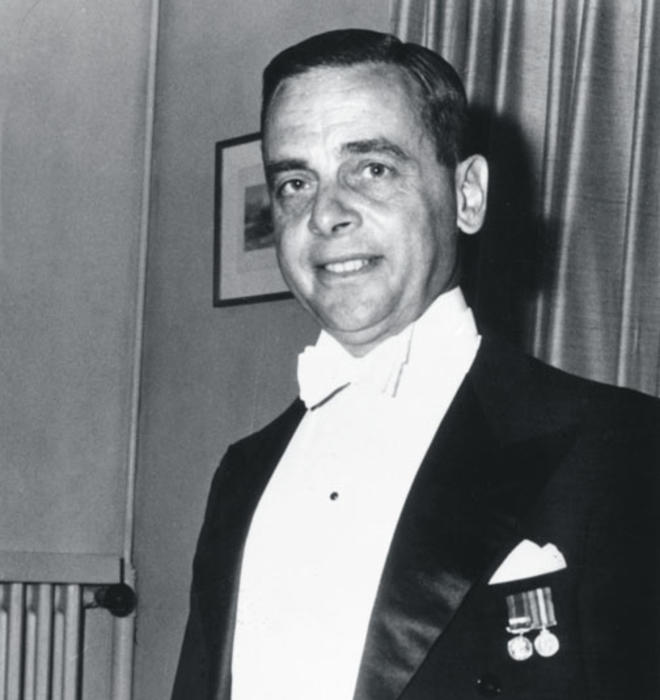
March 23, 1922 – Jan. 30, 2012
By the time Klaus Goldschlag arrived at Princeton to study Oriental languages, he already had lived a life that could fill a memoir. Yet his career was just beginning.
Born in Berlin, Germany, in 1922, Goldschlag was sent to an orphanage when his father died and his mother was too poor to raise him. Goldschlag, who was Jewish, might have died in a Nazi death camp had luck not intervened. In the mid-1930s, a Toronto businessman named Alan Coatsworth, aware that Germany’s Jews were in grave danger, offered to adopt a boy from the orphanage. Goldschlag was chosen after scoring highest on a test.
The teenager spoke no English when he arrived in Canada, but he quickly picked it up. His facility with language launched a career and helped make him one of the most prominent diplomats of his generation. Goldschlag had the “best foreign-policy mind,” says Allan Gotlieb, a former Canadian ambassador to the United States. “A very penetrating intellect ... I don’t know anybody at that time who could articulate or discuss an issue with such clarity.”
Goldschlag spoke nearly a dozen languages, including Persian, Arabic, and Aramaic. After graduating from Princeton, he began working as a foreign-service officer for the Canadian government, becoming ambassador to Turkey in 1967. When President Richard Nixon asserted in the early 1970s that the special relationship between Canada and the United States was dead, Goldschlag drew on his service in India, London, and Vienna and was key in cultivating Canada’s closer ties with Europe and Asia.
In an appointment Goldschlag hardly could have imagined when he left Germany as a boy, he returned to Berlin in 1980 as ambassador to West Germany. “He saw a virtuous circle, having left as an orphan and a Jew, and coming back as a Canadian and an ambassador,” his daughter Caroline Papadatos told The (Toronto) Globe and Mail.
Then, at the height of his diplomatic career, his life took another turn: While undergoing routine surgery in Germany, Goldschlag was severely debilitated by a medical error. He lost the ability to speak and walk, regaining some movement and language only after years of therapy. He lived for three more decades.
In his later years, Goldschlag enjoyed reading and traveling and took part in special events. But the man who had spoken so clearly on behalf of his adopted country could not easily be understood. He remained resilient nonetheless.
“His cheerfulness and style never left him,” says Gotlieb. “Even after his terrible accident, you could feel that sparkle, so to speak, in his manner.”
Maurice Timothy Reidy ’97 is online editor at America magazine.





1 Response
“Petey” Funk s’50 *52
10 Years AgoLives lived and lost
The Feb. 6 article on Klaus Goldschlag *49 was a reminder of how thankful we are for the lifelong friends we made in Princeton. After 68 years of marriage, our life is still filled with those memories.
Harley, my husband, was a student in architecture, and I was secretary of the philosophy department for five of the six years we lived in the Harrison Street project. Among our friends was Klaus, who with others from the Graduate College loved to come to our house for a home-cooked meal, a game of bridge, and a break from an all-male environment.
We continued our friendship with Klaus when he returned to Canada to join the Department of External Affairs. In the following years, we visited Klaus and his lovely wife, Shan, in Ottawa, Toronto, and in both Italy and Germany, where he served as Canadian ambassador.
In Germany, he suffered the medical mishap that left him paralyzed and without speech. After their return to Canada, he and Shan visited us in Wilmington, Del., and the four of us drove to Williamsburg. En route we visited some of his colleagues in Washington, including Ambassador Allan Gotlieb, and others from Klaus’ time as ambassador to Turkey. It was painful to observe Klaus’ frustration at his inability to communicate, but also heartwarming to observe the admiration and love expressed by his fellow diplomats.
We visited him only once after Shan’s death, but we kept in touch. Knowing this brilliant, lovely man was a rare privilege.